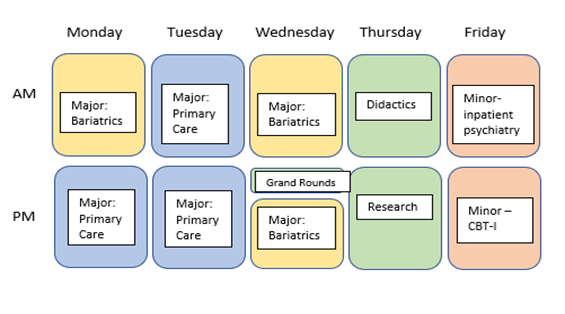Behavioral Medicine Major Rotations
Behavioral Medicine Major Rotations
Throughout the 12 months, the intern spends approximately 3 days per week participating in the experiences below. Interns complete four 6-month rotations (2 rotations are concurrent, 1.5 days each).
Interns can elect to complete an Area of Emphasis by participating in a major rotation for 1.5 days per week across the entire training year. Areas of Emphasis are available in Bariatrics and Transplant at this time.
Supervisors: Stephanie Cox, PhD, ABPP; Laura Aylward, PhD
Location: Chestnut Ridge Center/ Department of Surgery
Description: WVU Bariatrics offers a comprehensive surgical weight loss program including bariatric- trained surgeons, mid-level providers, dieticians, and psychologists. The intern has the opportunity to work as part of this multidisciplinary team in both assessment and intervention capacities. Interns receive training in pre-surgical psychological evaluations to determine a patient’s appropriateness for surgery. Additionally, interns can provide treatment to patients both pre and post surgically. Concerns commonly addressed include engagement in behavioral changes, treatment of disordered eating behavior, stabilization of psychiatric symptoms, etc. The intern also has the opportunity to attend team case review meetings and observe surgical procedures. The intern will also have the opportunity to lead and/or co-lead a monthly support group for pre- and postoperative patients.
Primary Care Behavioral Health
Supervisors: Barbara Cubic, PhD; Ruben Tinajero, PhD; Cassandra Homick, PhD
Location: Clark K. Sleeth Family Medicine
Description: The goal of this rotation is to increase the intern’s proficiency within the primary-care model; this includes the provision of population-based goal-oriented short-term treatment. The intern will participate in a variety of integrated primary care experiences including:
- Integrated Outpatient Clinic: Behavioral health care is integrated into our primary care clinics within the patient-centered medical home model. Common presenting problems in this setting may include comorbid medical/ psychological concerns, insomnia, medication compliance, adjustment disorders, insomnia, relationship stressors, depression/ anxiety.
- Family Medicine Inpatient Rounds/ Consultation: Family Medicine patients can continue to receive care by their primary care providers when they are admitted to Ruby Memorial Hospital. The intern has the opportunity to participate as a member of this multidisciplinary inpatient team (alongside residents, medical students, pharmacy, social work, etc.), providing consultation regarding psychological concerns and/or delivering brief psychological interventions in an inpatient setting.
- Family Medicine Specialty Clinics: The Department of Family Medicine offers several clinics to provide patients with specialty care to address their specific need. These clinics include the Medical Weight Management Clinic, Diabetes Clinic, and COPD clinic (depending on availability/scheduling). The intern, as a member of these multidisciplinary teams, provides education and treatment of patients’ conditions, including management of psychosocial issues that often co-occur with chronic illnesses. The goal of this team approach is to improve patient outcomes and increase adherence to prescribed treatment regimens. The intern provides consultation and brief assessment or intervention as needed.
Transplant
Supervisor: Laura Campbell, PhD
Location: Chestnut Ridge Center, Virtual
Description: The intern has the opportunity to work as part of a multidisciplinary transplant team in both assessment and intervention capacities. Interns receive training in pre-transplant psychological evaluations to support the patient and the team towards a successful transplant surgery. Additionally, interns can provide treatment to patients both pre and post surgically. Concerns commonly addressed include engagement in behavioral changes, stabilization of psychiatric symptoms, etc. The intern also has the opportunity to attend team case review meetings and observe surgical procedures.
Behavioral Medicine Outpatient Psychology
Supervisors: Stephanie Cox, PhD, ABPP; Colleen Lillard, PhD; Laura Aylward, PhD; Nick Jasinski, PhD, ABPP-CN
Location: Chestnut Ridge Center
Description: Interns provide assessment and evidence-based treatment to patients across the life-span with a wide range of presenting problems including those with co-morbid medical and psychiatric concerns. Interns will have regularly scheduled intakes and new patient evaluations throughout the rotation. Interns are encouraged to have a mixture of both short-term and long-term therapy cases. Interns receive supervision primarily from a Cognitive- Behavioral orientation, although interns may also receive training in other evidence-based approaches such as Acceptance and Commitment Therapy and Motivational Interviewing. We are able to select specific patient populations or disorders of interest in order to advance an intern’s training in a specific area or to address any gaps in training.
Behavioral Medicine Specialty experiences are available in:
- Functional Movement Disorders
- Pain – opioid risk assessment, pre-surgical assessments, intervention
- Forensics
Lifespan experience in Pediatric and AYA (adolescent/young adult) Behavioral Medicine/ Psychology Clinic:
Supervisors: Jennifer Ludrosky, PhD; Stephany Lora, PsyD; Jonathan Perle, PhD, ABPP; Janelle Mentrikoski, PhD; Maria Khan, PhD
Location: Chestnut Ridge Center
Interns will have the option to participate in fully integrated pediatric clinic(s), outpatient child clinical services, child/adolescent psychiatric consultation and liaison. Intern experience focuses on health psychology across the lifespan, assessment and intervention with children and families, and work in multidisciplinary clinics. Options include:
- Pediatric GI Clinic
- Pediatric Nephrology Clinic
- Pediatric Cleft Palate Clinic
- Parent Management Training (PMT) Clinic
- ADHD Assessment Clinic
- Medical Coping Clinic for Adolescents (MECCA)
- Family Weight Management Clinic
Supervision: Interns will meet with each of their supervisors for a total of 2 or more hours per week of individual supervision. Additionally, interns receive informal supervision in the course of observing therapy or conducting co-therapy with the supervisor, staffing after intake evaluations, and in multidisciplinary meetings. Supervision totals 4 or more hours per week.
Sample Schedule:
